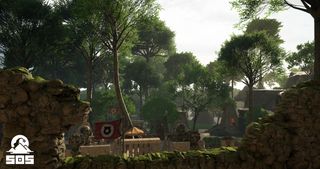SOS is a battle royale game you can win with your voice
PUBG meets The Truman Show in SOS, a survival game about performance and roleplaying.
SOS is a survival game where surviving isn't the only way to win. You're on a dangerous tropical island with 15 other players, and three of you—at most—will escape. But you're also on a fictional reality TV show called SOS. If you're more entertaining than your competitors, the real-life audience watching you on Twitch can help you win. Even if you die.
It's a clever crack at the booming battle royale genre—what if social skills and showmanship mattered as much as fragging ability? A microphone is required to play SOS, and all players can talk freely through proximity-based voice chat. A counter at the bottom of your screen continually tracks how many people are spectating you, and another panel surfaces which emote viewers are sending you. When you die, you become one of these spectators.
In other words, this SOS isn't interested in being the next PUBG. It wants to be something closer to PlayerUnknown's Gilligan's Island.

How well can goofy, extroverted roleplaying can coexist with cutthroat tactics?
The studio making it, Outpost Games, is led by industry veterans who have worked on stuff like Dead Space, Battlefield Hardline, and EA's 007 series. Outpost's vision is to "imagine what a game might look like if it was built from the beginning to be as fun to watch as it is to play," according to studio CEO and co-founder Wright Bagwell. "We formed Outpost Games with the mission to turn every player into a performer, and every game into a stage."
You've probably seen clips of clever roleplaying and acts of social engineering in sandbox games like DayZ, or GTA 5 roleplaying, or our very own Steven Messner being drugged and forced to sing karaoke in ARK. SOS' pitch is that it explicitly encourages and designs for the sort of pretending that players are already getting up to in these games.
"We've seen online a lot of games where people are sort of trying to create something, maybe they're roleplaying in GTA, or doing things in other games that are not exactly what the original game intended," creative director and SOS 'showrunner' Ian Milham tells me. "And the game, it kind of allows for it, but not really. And players are like 'We want to do this,' And the game's going, 'No, you should go capture the flag right now, or you should go get inside this circle for two minutes.' We believe that we can make a game that is not only cool with [what those players want] but is adding to it, and suggests things."

Milham gives an example of the type of behavior SOS has inspired in its alpha. "There's a streamer who tends to win more than the average, and almost purely through social engineering. She just sort of makes friends, turns people against one another. She had two people who were both infected and needed the antidote that she had. She made them have a rap battle to decide who was going to get the antidote."
The biggest gaming news, reviews and hardware deals
Keep up to date with the most important stories and the best deals, as picked by the PC Gamer team.
Lord of the Televised
The $19 million question—the level of funding Outpost has raised so far—is how well goofy, extroverted roleplaying can coexist with cutthroat tactics. SOS steps into the genre with original ideas, but it also inherits battle royale's kill-on-sight mindset. Will an average match of SOS fall apart if most of the competitors aren't willing roleplayers?
I'm the furthest thing from an entertaining streamer, and I greatly enjoyed the matches of SOS that I played. I think SOS has the potential to be an excellent story generator. It doesn't hurt that it's also a comfortable, aesthetically clean first-person game with expressive animations and character models. It's pleasant just extending a held item in your hand to another player (the T key) and seeing them take it. Movement, too, is smooth and forgiving, making SOS' Hollywoodized, lush island fun to traverse.

SOS will sit atop a new interactive livestreaming portal called Hero.tv, the portal through which spectators can watch and interact with players by voting to help or hurt them (with air drops, for example) and send emotes, the face-shaped points system that determines who becomes a Fan Favorite at the end of a match.
Propelling the fun I had, though, were several of those aforementioned charismatic roleplayers. The matches I played were populated by a handful of experienced alpha testers picked by Outpost to play alongside members of the press. I had a great time running with Classypax, who roleplayed as a supportive Christopher Walken in the video embedded at the top of this page. Going relic hunting with him, evading and fighting the deadly ape-like monsters that populate the island, and then being escorted to helicopter freedom by a convincing, quirky Walken is one of my gaming highlights of the year.
One more standout moment from that session: in an abandoned temple, Mr. Walken suggested that we play dodgeball with the skulls we'd collected on our journey so far. Later, when we encountered a major enemy that held a relic, he simply yelled "Skull dodgeball!" to cue our ranged attacks, and we both knew what to do.
One thing that could insulate SOS from 'kill-on-sight culture' is that it doesn't exude the macho, competitive intensity of games like PUBG or CS:GO. Matches have a 30-minute timer, but SOS otherwise doesn't exert much pressure. There's no ever-shrinking 'circle' to corral the action. Guns and bullets are pretty rare, and Outpost has deliberately omitted anything resembling a rifle for more intimate pistols and hatchets. Kills aren't tracked on any kind of mid-match scoreboard.
There also isn't a wide spectrum of loot to lust after (backpacks aren't worn, and players don't carry body armor or other defensive items), so taking someone out doesn't really leapfrog you up the food chain. One exception is the infection, a mechanic that stimulates betrayal and bargaining. If you absorb a hit from one of the AI monsters on the island, there's a chance you'll become infected. An infected character will exhibit visible signs on their skin before eventually turning into an AI-controlled rage zombie. Eating the neon mushrooms that dot the island will keep the infection at bay, but what you're really looking for is a rare antidote to fully cure the disease.
SOS is a bet on the idea that rap battling in front of a live internet audience is a lot more fun than just shooting someone to get that antidote. It'll be interesting to see how that idea holds up as players with a variety of preferences and personalities try SOS' beta next week (sign up here) ahead of a full release early next year.

Evan's a hardcore FPS enthusiast who joined PC Gamer in 2008. After an era spent publishing reviews, news, and cover features, he now oversees editorial operations for PC Gamer worldwide, including setting policy, training, and editing stories written by the wider team. His most-played FPSes are CS:GO, Team Fortress 2, Team Fortress Classic, Rainbow Six Siege, and Arma 2. His first multiplayer FPS was Quake 2, played on serial LAN in his uncle's basement, the ideal conditions for instilling a lifelong fondness for fragging. Evan also leads production of the PC Gaming Show, the annual E3 showcase event dedicated to PC gaming.
Most Popular


